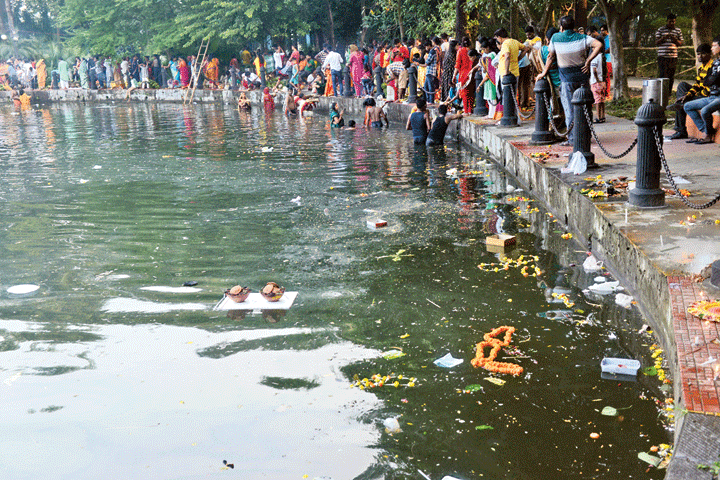If Saturday was bad, Sunday was worse at Rabindra Sarobar.
Worshippers descended on the premises of the south Calcutta lake to perform Chhath Puja early on Sunday and placed oil-filled lamps on the water and mauled the green. A large number of them also threw plastic bags and bottles into the water body.
The National Green Tribunal had in 2017 banned “any puja, community picnic and social event” on the 192-acre Rabindra Sarobar premises.
The worshippers played drums, lit flames to perform yajna and burst firecrackers on the green on Sunday morning, doing everything that is not allowed at the Sarobar.
Oil from lamps spilled into the water, which was further polluted with the pouring of ghee by worshippers.
None of these — placing lamps on and throwing plastic into the water and lighting flames — happened on Saturday. Like on Saturday, no policeman was seen around the water body.
On Saturday, at least private guards were there to stop worhippers from entering the compound with bands and plastic bags. On Sunday, even the guards vanished.Metro saw small goods vehicles, hired to ferry worshippers to the lake and back home, parked on the Sarobar premises. Music was blaring out of boxes placed atop them.
A group of revellers had forcibly entered the compound after breaking the locks on several gates on Saturday and performed the Chhath rituals. The CMDA had decided to keep the compound closed from Friday midnight till Sunday noon in an attempt to comply with the National Green Tribunal order.
Environment activists said the damage to the biodiversity of the lake and the green was immense.
A senior scientist working for the state environment department said the impact of flowers, ghee, oil and milk can lead to the death of fish and other insects in the water.
“The ghee and oil create a layer above the water. That prevents oxygen in the air to mix with the water, thereby killing fish and insects,” said the scientist, who spoke on the condition of anonymity.
“Flowers cannot decompose in the absence of adequate oxygen.... The micro-organisms that feed on the milk poured by worshippers need oxygen to digest the food. What happens is that the supply of oxygen declines while the demand goes up. That may lead to a situation where all fish and insects would perish.”
A team from the state pollution control board visited the Sarobar on Sunday and collected water samples. “We will test the samples to measure various parameters such as dissolved oxygen. That will give us an indication of the impact of the Chhath rituals on the water body,” a official of the board said.
“In a recent test, we found 9mg of dissolved oxygen in one litre of water collected from Rabindra Sarobar. Anything above 5mg/litre is good. The test of Sunday’s samples will reveal the amount of dissolved oxygen in the water immediately after the rituals.”
Scientists said the noise produced by crackers and drums had scared away many birds. The green around Rabindra Sarobar is known to be home to a rich variety of birds. A lot of migratory birds from colder climes winter in the area.











